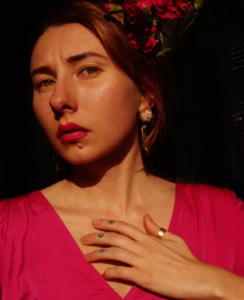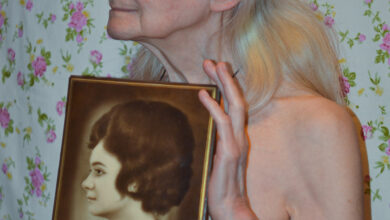
My name is Jane. I am a photographer from Ukraine. The war caught up with me when I was in my village, Cherkas’kiy Tyshky, with my grandfather and grandmother. We were occupied instantly on February 24, 2022, at 6 a.m.
15 kilometers is the distance that separated our village, which is under occupation by Russian forces, and Kharkiv, which is held by Ukrainian troops.
My village, which is between Kharkiv and the Russian border, is still under occupation. I managed to escape, but I spent twenty days there, which I will describe in this weekly column.
When the thaw set in, snow mixed with the soil, creating sticky mud. A rumor had started in our village that there was a humanitarian aid distribution. People started running, not knowing where to go and what to look for. I was outside. It was a temporary lull. Water was running down the icicles, and the sun was dazzling. It was the first day when I felt the breath of the spring. I was easy in my mind, even joyful. I wanted to live.
Somebody knocked on my gate. A neighbor was looking for me. She told me that someone was giving away meat, and I needed to run and get some. I knew I needed to go because we were running out of our provision, having five cats and a dog. My grandpa and grandma barely walked, thus I needed to go. Because no one knew when and whether, at all, it all is going to end.
Near the rural council, someone was giving out meat. To reach there, I needed to go through a cemetery.
The cemetery of my childhood. A place where all the kids from my street played Kazaks and robbers (the Ukrainian version of cops and robbers). We would hide between the graves, run around and scream, and no one had ever forbidden us to play in the graveyard. My great-grandparents are buried there together with other relatives, including those that I have never met. It is my cemetery. My blood is there. My roots are there. Every time I had to walk through it, I would say hello to my great-grandparents. But this time I felt the graves were silent, they did not welcome me, they were outraged.

A delivery truck with the word “Denver” on the side was standing next to the rural council. It was the name of our meat factory. Soldiers had opened the truck full of meat. It stank of the blood of recently butchered cows.
The distribution had started. The soldiers held off; they did not want to muss their hands. Our men handled the carcasses for people. The soldiers had watched and filmed how our men gave carcasses to our people. Later, this story would be used in the media as a “gallant help from Russian soldiers to Ukrainian people”. Our meat. From our farm. That was brought by our delivery truck, and distributed by our men.
I took a big piece of meat. It was around 10 kilograms, maybe more. It was still alive, bleeding. I took it and went back home through the graveyard. The sun was baking me alive. Well-known walkways between the graves changed into the ford. My feet were sticking into the mud; the meat was dripping with blood.
I was walking past my great-granddad’s grave and felt a lump in my throat.
“Grandpa, if you had seen what was happening to your land…what kind of shameful people tramp it down…”, I thought.
Tears started flowing out of me. I was talking to my great-grandfather and crying for both the first time and the last time during the war. The good thing is that he died without seeing them raping his land.
The meat was bleeding. I was crying. The mud was moving on the ground, warmed by the sun. The spring was at its full, but we did not want it. Hell! Life used to be exuberant here. It could all so easily be dead.
In the end, soldiers mined the cemetery and banned us from going there. They mined my ancestors, my history and my roots. What a depressing shame—without any virtue, respect—had come to our land. What an awful Jesuistic game. It is a good thing that my great-grandfather died. He was a man of high quality. He would not be able to tolerate this filth.






